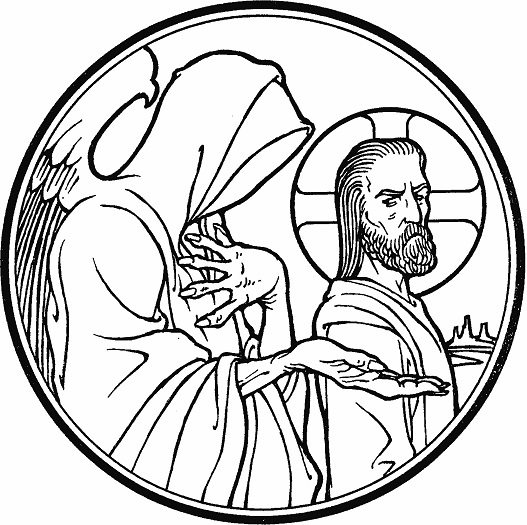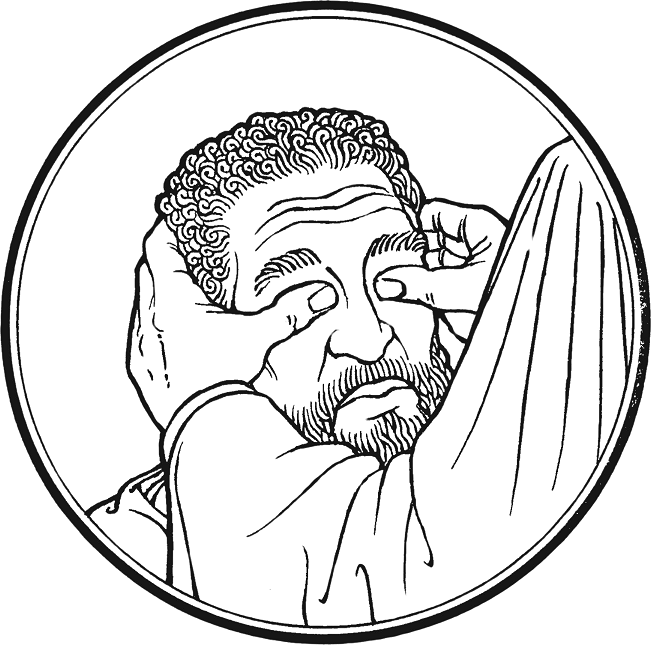Readings: Genesis 32:22-32 | 1 Thessalonians 4:1-7 | Matthew 15:21-28
Text: Genesis 32:22-32
One of our world’s favorite questions is to ask, “Where is God?” When the floods rage, where is your God? When the tornadoes touch down, where is your God? When tidal waves destroy, when earthquakes level cities, or people die, where is your God? “I thought He was good. I thought He was all-powerful. I thought He loved you.”

In fact, why wait for the big things. What about when it happens in your life? When a loved one dies, where is your God? When you find out you have cancer, where is your God? When you can’t make ends meet, when everything goes wrong, when you hurt most of all, where is your God?
It’s a good question to ask, really. Because we don’t bother with where God is until something terrible comes up. Everyday routine stuff, what’s God have to do with that? I don’t go looking for God every time I write a check, or wash my hair. I don’t go looking for God when I put on my pajamas or watch an evening sitcom. I don’t go looking for God when the 49ers take the field…except when they lose the Super Bowl. Well, maybe then. But that’s different. For the most part, we can handle it on our own.
Jacob was also pretty good at handling things on his own. He skillfully negotiated Esau’s birthright out from under him for a bowl of stew without any help. Jacob and his Mom got Dad to give him the blessing instead of Esau without a single prayer. He convinced his future father-in-law to let him marry his daughter just on his own skills. He convinced his father-in-law to let him marry his other daughter after his father-in-law conned him into the ugly one—poor, unloved Leah. He came up with that plan all by himself. When he was only allowed to keep the defective sheep for his flock, he managed to breed them all to look defective. When He heard his brothers-in-law were jealous enough to hurt him, He got his family the heck out of Dodge. And as we see in this text, when Esau’s on his way, he’s got an escape route all planned out, just in case things go south.
Jacob talks a big game about God. He’ll say that God blessed him with this. That God was looking out for him in that. That God is a really great guy. But you know? It’s been the Jacob show all along. And now, Esau has small army. And Esau was looking to kill him not that long ago. And Esau isn’t going to be bribed out of his anger. And even just sending the women and children across the river is only buying time. So Jacob, where is your God now?
Right in front of him, trying to pop him in the teeth. It’s funny, the word for wrestle in Hebrew: אבק. It literally means to kick up dust. And I think both meanings are intended here. Jacob has a history of turning tail. But God’s not going to let him go this time.
But now? Can’t you go wrestle Esau instead? This is the worst possible time, God. And God does come at the worst possible time. For Jacob, and for us. Can’t you wait until I’m ready? Can’t you wait until I’ve got time to deal with you? Our moment might not be a life and death showdown with Esau. But it’s often not far from that. It’s when there’s too much going on. Too much to handle. And we need to be completely on top of our game if we’re going to get through it.
It’s then that God gets up in our faces. Wrenches our hip out of socket. Breaks us in such a way that we just can’t do it anymore. Why?! And why now, God?! To teach us some divine object lesson? To show us that we need Him for everything? To knock us off our high horse? Humiliate us into bowing our heads? Perhaps. He’s there to tell Jacob, and tell you that, “you have striven with God and with men, and have prevailed.”

Prevailed? Let me get this straight. God comes down, puts Jacob in a headlock, breaks his hip, all to tell Jacob that Jacob wins? God makes a trainwreck of my life, turns everything upside down, hurts me badly, all to tell me I win? How does that make any sense? I could understand it if he wanted to show me that I need Him. I could understand if He wanted to me to keep my eyes on Him at all times. I could understand if He wanted me to pray more, get Him more involved in my life, and stop doing it alone. True, He exercises our faith to that goal. But God uses that place and that time to give Jacob a message: You have already prevailed. It’s a message to us: You have already prevailed.
When you’re used to doing it on your own, it can be overwhelming when you can’t. When you’ve relied on only yourself and your own means, it’s frightening when there’s nothing left. When you’ve pulled yourself up by your bootstraps all your life, it’s absolutely crushing when there’s nowhere left to pull. You cannot win. You cannot prevail. So God has to tell you that you already have…yet not in a way that you can rest in your hard work.
Because Jesus died on your behalf. Jesus rose again for you. Jesus won. Jesus prevailed. Yes, He did. Sin, death and Hell, He conquered them all. Sin is overcome, because He carried all that sin with Him when He died. Death is undone, because it couldn’t hold Him when He rose on the third day. Hell is beaten, because He unlocked its gates and set the captives free. Satan is vanquished, all because of Jesus. Not us. Jesus.
So how can God tell us that we’ve already prevailed? Because Jesus has already given all this to you. It’s certainly not because you were always there. Not because you leaned on Him at the right time. (that would be a lie) Not because you had a good relationship with Him. You have overcome because God gives. He gives even to those who aren’t really good at doing the right thing–even to those like Jacob the swindler in our text.
That’s an incredible comfort for us. In a world that is so geared toward one’s own getting ahead. We see this in the wrestling of the Canaanite woman in the Gospel (Matt. 15:21-28). She comes to Jesus, and it seems like He’s her enemy. What’s up with Jesus’ responses? Saying He hasn’t been sent to her, implying that she’s a dog, and pushing her off these three times?
But in her responses, we see faith—the gift of God—at work. Look at them:

- “Have mercy on me, O Lord, Son of David; my daughter is severely oppressed by a demon.”
- But she came and knelt before him, saying, “Lord, help me.”
- “Yes, Lord, yet even the dogs eat the crumbs that fall from their masters’ table.
As strange as this sounds, this is the work of faith. Faith doesn’t come to God boasting about how much we’ve done for God. It doesn’t count the hours we’ve agonized for those for whom we’ve kept vigil. Faith doesn’t expect that God should move heaven and earth because of something in us. No, faith comes in humility before God-in-the-flesh.
There’s a song that’s making the rounds right now that goes,
“You say I am loved when I can’t feel a thing
You say I am strong when I think I am weak
And You say I am held when I am falling short
And when I don’t belong, oh You say I am Yours…
What You say of me, I believe” [1]
What if God were to say to you, “You don’t deserve His goodness”? “You are of no account, and ‘I have mercy on whom I have mercy’?” [Exodus 33:19] What if God calls you a dog, begging from the table? What faith says is, Yes and Amen. And in that confession, as weak as it sounds, you have the victory.
Jesus has given you His death and resurrection, and because you have that, God is right. You have already prevailed. Whatever you face in life, whatever the world does to you, and whatever Satan would use against you. You have already prevailed. In faith, you have faced off with God, and God has declared you the winner. What can anything else do to take that away?
None of the things that matter before God can be taken forever. The resurrection is coming. And we look forward to that with all our hearts. To our eyes, and to the eyes of those around us, it doesn’t look like victory. Does it ever look like defeat and Pollyannaism! Faith looks foolish to the unbelieving. But to the faithful, we trust that God has the victory; that God is true and we will say Amen to Him even though all others scoff. In the meantime, when the world asks, “Where is your God.” You have an answer. He’s right here, giving me Jesus.
In the Name + of Jesus. Amen.

[1] Lauren Daigle – “You Say”















